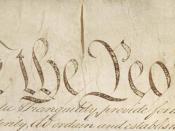1. Before the UCC and UCITA, what was one of the first, and most significant, of the U.S. government's attempts to promote uniformity in commercial laws from state to state?
I think the most significant attempt to promote uniformity in commercial laws from state to state was the "commerce clause", which is found in article 1, section 8 of the U.S. Constitution. Two key factors in section 8 are; "To regulate Commerce with foreign Nations, and among the several States, and with the Indian Tribes" and "To establish a uniform Rule of Naturalization and uniform Laws on the subject of Bankruptcies throughout the United States".
2. Based on the information presented above, what do you see as the major differences between Article 2 of the Uniform Commercial Code and UCITA?
The computer information transactions involve licenses, not sales. It also extends easily to sales of computers and computer peripherals.
UCITA was initially proposed as an amendment to the Uniform Commercial Code. The UCC, article 2 involves sales among other issues. These rules are to govern commercial transactions. Article 2 is also applied by federal courts to sales contracts governed by federal law.
3. What is the legal distinction between selling a product and licensing it?
The difference between selling and licensing is significant. The sale of a physical copy of a work has been the dominant model for transferring the individual product to the consumer. Sales involve the complete transfer of ownership rights in the copy. Copyright law explicitly anticipates the sale of intellectual property products and, by the 'first sale rule,' constrains a copyright holder's rights in copies of the work that have been sold. For example, the purchaser is free to lend, rent, or resell the purchased copy. Licensing, however, constitutes a limited transfer of rights...


